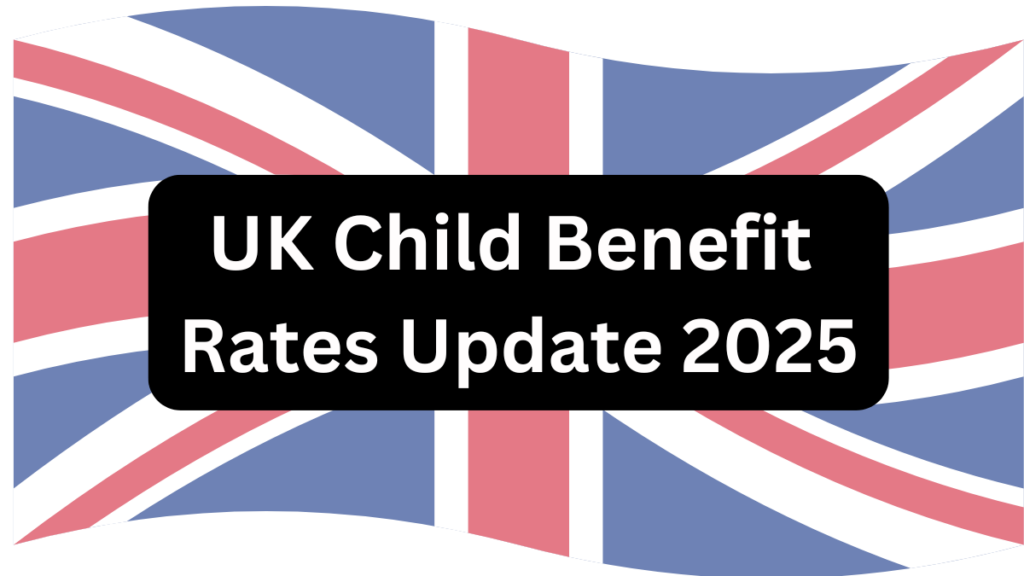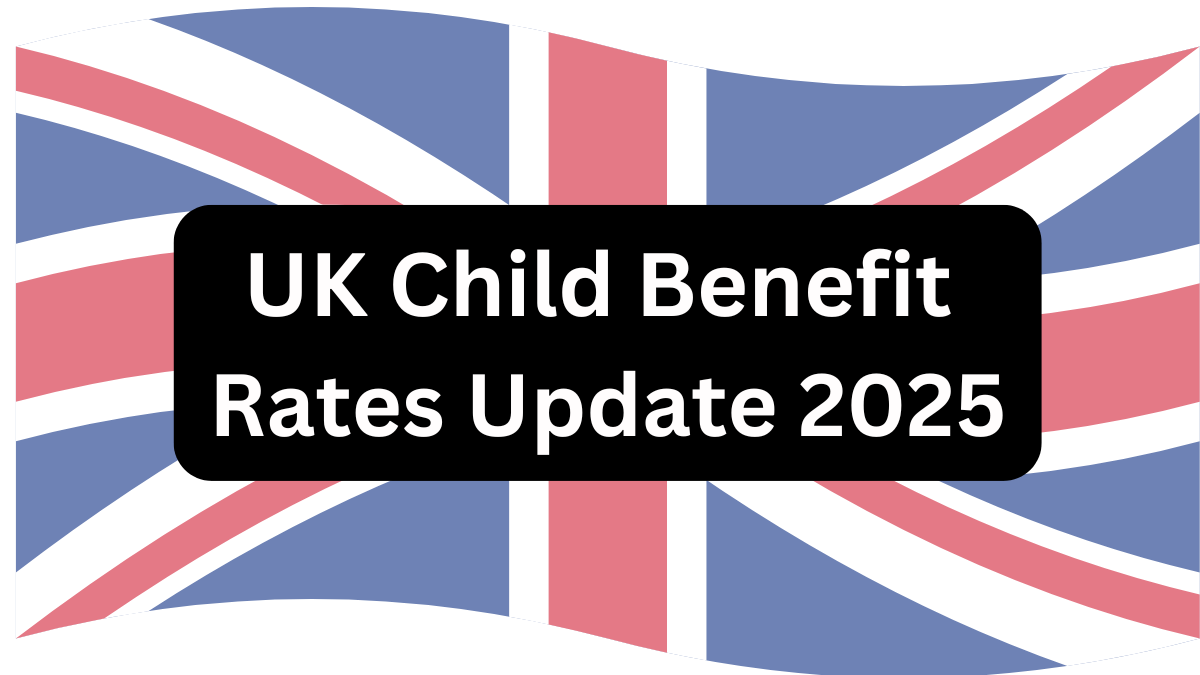The UK government has announced new Child Benefit rates, set to take effect in April 2025. These changes aim to provide increased financial support to families across the country. If you are a parent or guardian, understanding these updates will help you ensure you receive the full benefits you are entitled to.
This article covers:
- The updated Child Benefit rates
- Eligibility criteria for claims
- The two-child benefit cap
- The High-Income Child Benefit Charge (HICBC)
- The link between Child Benefit and National Insurance credits

Updated Child Benefit Rates (April 2025)
The Department for Work and Pensions (DWP) has confirmed that Child Benefit payments will increase in April 2025. The revised weekly rates are:
| Child | Current Weekly Rate | New Weekly Rate (April 2025) |
|---|---|---|
| First child | £25.60 | £26.05 |
| Additional children | £16.95 | £17.25 |
Key Points to Note:
- Automatic Increase – Families currently receiving Child Benefits do not need to reapply. The new rates will be adjusted automatically.
- No Limit on Claims – There is no cap on the number of children for whom you can claim Child Benefit.
- Universal Credit Limitation – Families receiving Universal Credit can only claim benefits for two children under the benefit cap rules.
The Two-Child Benefit Cap: Will It Change?
The two-child benefit cap has been a point of debate in UK politics. Recently, Sir Stephen Timms, the Work and Pensions Minister, addressed concerns raised by former Labour leader Jeremy Corbyn regarding the policy’s future.
Current Status
- The Child Poverty Taskforce is reviewing government measures to support low-income families.
- No immediate plans to remove the two-child limit, though changes may be considered in the future.
What This Means for Families
- Families with more than two children will continue to face limitations in their Universal Credit claims.
- The government’s task force report may propose adjustments, but no changes have been confirmed yet.
Who Is Eligible for Child Benefit?
To qualify for Child Benefit, parents or guardians must be responsible for a child who is:
- Under 16 years old
- Under 20 years old, if they remain in approved education or training
Approved Education and Training Includes
- A-levels or equivalent
- Apprenticeships
- Vocational training (must be government-approved)
If your child continues studying beyond 16, you can extend your claim until they turn 20.
The High-Income Child Benefit Charge (HICBC)
The High-Income Child Benefit Charge (HICBC) applies to households where one parent or guardian earns above a certain threshold.
| Income Level | Impact on Child Benefit |
|---|---|
| £50,000 – £79,999 | Partial repayment is required via tax |
| £80,000 or more | Full repayment required (no net benefit) |
How HICBC Works
- If either parent earns above £50,000, they must repay some or all of the Child Benefit through self-assessment tax returns.
- The higher the income, the greater the repayment.
- If one parent earns £80,000 or more, the entire Child Benefit amount must be repaid.
Who Pays the Charge?
The partner with the highest income is responsible for filing a self-assessment tax return and repaying the required amount.
How to Reduce the Impact of HICBC?
- Opt out of receiving Child Benefits to avoid tax repayments.
- Contribute more to a pension scheme to reduce adjusted net income.
- Split income more evenly between partners (if possible) to stay below the threshold.
Child Benefit and National Insurance (NI) Credits
One hidden advantage of claiming Child Benefits is its link to National Insurance (NI) contributions. These credits help build State Pension entitlements, ensuring that parents who are not working or earning below the NI threshold do not face gaps in their pension record.
Who Can Benefit from NI Credits?
- Parents and guardians who claim Child Benefit for children under 12
- Spouses or partners who can request a transfer of credits
- Grandparents or relatives providing childcare who can apply for Specified Adult Childcare Credits
Important: Only one person can claim Child Benefit for each child, so families should decide who will benefit most from the NI credits.
How to Claim or Update Your Child Benefit Details?
For New Parents
- Claims can be backdated for up to 3 months, so apply as soon as possible.
For Existing Claimants
If you need to update details (such as bank accounts or addresses), you can do so via GOV.UK.
Steps to Update Your Details
- Visit GOV.UK Child Benefit Portal.
- Log in with your credentials.
- Update bank details, address, or other required information.
- Confirm changes and submit.
FAQs
1. When will the new Child Benefit rates take effect?
The updated rates will be implemented from April 2025. Families do not need to reapply, as the new payments will be automatically adjusted.
2. How can I avoid paying the High-Income Child Benefit Charge (HICBC)?
If your income is above £50,000, you can:
- Opt out of receiving Child Benefit.
- Contribute more to a pension scheme to reduce your adjusted net income.
- Split income more evenly between partners (if possible).
3. Can both parents claim Child Benefit for the same child?
No. Only one parent or guardian can claim Child Benefit for each child. However, National Insurance credits can sometimes be transferred between partners or other caregivers.
4. Will the two-child benefit cap be removed?
Currently, there are no confirmed plans to remove the two-child cap. However, discussions are ongoing within the Child Poverty Taskforce, and future changes may be considered.
Final Thoughts
The April 2025 update to Child Benefit rates offers a modest increase in financial support for families. However, eligibility rules, tax charges, and the two-child cap remain complex issues that parents must navigate carefully.
Key Takeaways
- New rates start in April 2025 – payments will be automatically adjusted.
- Two-child benefit cap remains in place for Universal Credit claimants.
- High earners (£50,000+) may need to repay Child Benefit via tax returns.
- Claiming Child Benefit helps protect National Insurance contributions for the State Pension.
For further details and to maximize your benefits, visit GOV.UK.
If your household income is near the HICBC threshold, consult a tax advisor to explore ways to reduce tax obligations while maximizing benefits.
Click here to learn more
Sachin is an experienced writer with a strong background in education-related content. With years of expertise in creating informative and engaging material, he covers topics such as teaching strategies, educational technology, and learning methodologies. His work aims to inspire both educators and learners, reflecting his deep understanding of the evolving education landscape.

